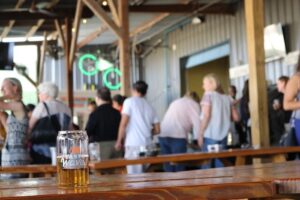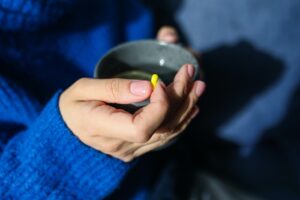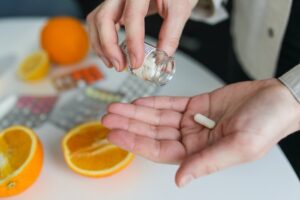Drug And Alcohol Rehab In Northern Ireland

Climbing rates of substance use disorder have hit communities hard across the globe, including those in Northern Ireland.
However, behind the news articles and reports documenting this worrying trend, real lives are being impacted, and countless families are left shattered.
In the year 2020, The Northern Ireland Substance Misuse Database (NISD) recorded 4,264 clients as having presented to services for addiction. In this group, more than one-third (35.8%) had sought treatment for problematic drug use.
Of the patients presenting to services for drug addictions, 67.9% indicated daily use, and more than one in ten reported injecting heroin or opioids.
Tragically, such hazardous use has led to a rise in fatalities, with 218 drug-related deaths reported by the NIRSA in 2020.
In the same NISD report, 32.8 % of the 4,264 addiction treatment clients described their hazardous alcohol consumption.
Of the individuals attending for alcohol use, almost half (45%) indicated daily consumption and therefore required the support of a specialised drug & alcohol rehab in Northern Ireland.
To learn more about addiction recovery in Northern Ireland, call our team today on 0800 326 5559
Taking The First Steps

We know it’s a huge step to admit that you have a problem and an even bigger step to seek help.
Rehab can be intimidating for many reasons. Perhaps you are afraid of what it might be like, you’re not sure whether you can successfully complete the programme, or you think it’s unaffordable for you.
We understand and help people in your situation every single day. There is no judgement here, and everything that you tell us will be treated in the strictest confidence.
The truth is, whether you realise it or not, simply by researching drug and alcohol rehab facilities in your area, you have already taken a bold step in the right direction.
Before you admit your addiction problems to others or seek help to overcome them, you must admit them to yourself.
If you’ve found yourself here, then you have already considered that to some degree. Alternatively, you may be searching on behalf of a family member or close friend whom you are concerned about.
We can help you too. However, you must understand that addiction recovery will need to be entered into willingly in order to succeed. As much as we might want to, there is no way to force somebody to get better.
Professional drug and alcohol addiction treatment in Northern Ireland offers you the best chance of achieving that recovery you desire and living a happier, healthier and sober life.
Here at OK Rehab, we can help you to choose the right programme for you and support you in your decision, answering any concerns you may have about committing to a rehab programme.
Take the first steps towards recovery in Northern Ireland today by calling us on 0800 326 5559
How Do I Know I’m Addicted?

Recognising addiction is rarely black and white, as some symptoms will manifest in some individuals but not in others.
Fortunately, there are many diagnostic manuals to take advantage of if you feel that something isn’t right in yourself or someone you love.
While many of the following screening manuals can be used as self-assessment tools, it’s important not to self-diagnose.
If you recognise the symptoms listed by diagnostic models, it’s crucial to seek the advice of a professional at a drug & alcohol rehab in Northern Ireland.
For those concerned about their alcohol use, The CAGE Questionnaire is a screening test used by clinicians at drug & alcohol rehabs across Northern Ireland or in NHS services.
Rather than an in-depth interview, its four questions are used as the first port of call for potentially problematic drinkers.
To learn more about diagnosing addiction, call us today on 0800 326 5559
The CAGE Questionnaire

The name CAGE is an acronym for the focus of each question: Cutting down, Annoyance from criticism, Guilty feelings, and Eye-openers.
Such questions give subjects the chance to self-evaluate in light of these alcoholism warning signs and are as follows:
- Have you ever felt you should Cut down on your drinking?
- Have people Annoyed you by criticising your drinking?
- Have you ever felt bad or Guilty about your drinking?
- Have you ever had a drink first thing in the morning to steady your nerves or get rid of a hangover (Eye-opener)?
If the individual responds yes to just one of these questions, it can indicate the presence of alcohol addiction.
For example, should they answer yes to the “eye-opener” question, which describes drinking in the morning to offset withdrawal symptoms, they should seek immediate professional care.
AUDIT
Another, more in-depth assessment and diagnostic aid are the Alcohol Use Disorder Identification Test or AUDIT.
In order to obtain a score indicating their individual severity, subjects must answer ten questions concerned with different elements of addiction, such as consumption, dependence, and consequences.
For example, question three asks, “How often do you have five or more drinks on one occasion?” to which the subject must estimate a relevant time frame such as “monthly” or “daily”.
After they’ve answered each question truthfully, subjects will receive a score that represents a risk zone. Each zone is accompanied by an explanation and action, such as suggesting an intervention or a specialised assessment.
If a subject scores more than four, they are susceptible to developing health problems in the future, while someone scoring thirteen or higher should swiftly seek the services of a drug & alcohol rehab in Northern Ireland.
For more information, call our team today on 0800 326 5559
DSM-5

One frequently used example is the Diagnostics and Statistical Manual of Mental Disorders (DSM-5).
Developed by psychiatrists, The DSM-5 provides a guideline for clinicians to determine how serious a substance use disorder is.
The framework is split into four levels of addiction and within these are more specific symptoms and clinical advice. The criteria are;
- Physical addiction (experiencing signs and symptoms of withdrawal)
- Impaired control (trying to achieve sobriety but being unable to)
- Risky use (using in hazardous quantities or unsuitable places)
- Social difficulties (problems in relationships, occupational issues, etc.)
An individual’s severity is characterised by the number of symptoms they relate to.
For instance, if a subject is suffering from two symptoms, it would indicate a mild substance use disorder, whereas recognising three indicates a moderate addiction, and so forth.
Call our team today on 0800 326 5559
Staging An Intervention In Northern Ireland

Oftentimes, those searching for an appropriate drug & alcohol rehab in Northern Ireland are doing so for a loved one and are not suffering directly from substance use disorder.
Perhaps one of the most distressing ways someone can indirectly suffer from addiction is watching their loved one refuse to seek help.
Victims of SUD can decline professional help for a variety of reasons: from denying their symptoms to believing that there is no feasible way out of their addiction.
Whatever the reason, their loved ones can schedule an intervention that is professionally guided to enhance success.
At OK Rehab, we can assign you an interventionist who is based in your local area. They will tailor the interventions to your family’s needs and will perform sessions in a safe space, such as a nearby drug & alcohol rehab in Northern Ireland.
In these face-to-face meetings, the person using drugs or alcohol will engage in conversations with their loved ones.
Friends and family will openly discuss how the individual’s substance use is impacting them and explain why they should seek expert support.
For more guidance on holding an intervention in Northern Ireland, call our team on 0800 326 5559
The CRAFT Method

An interventionist may use a methodology to guide sessions, such as Community Reinforcement And Family Training (CRAFT).
CRAFT emphasises positive reinforcement to ensure that both the victim of SUD and their families feel comfortable and taken care of in the intervention process.
Instead of confronting their loved ones, intervention participants will learn how to steer the victim away from substance abuse.
Close Significant Others (CSOs) will reward the subject when they show control over their actions or actively choose sobriety.
To learn more about the CRAFT Method, call us on 0800 326 5559
What Is The Cost Of Private Or NHS Drug And Alcohol Rehab?

When estimating the cost of rehabilitation, it’s useful to categorise the type of treatment into inpatient and outpatient care.
Inpatient care includes facility-based fees, as patients will be living on-site at a local drug & alcohol rehab in Northern Ireland, while outpatient care involves patients returning home after daily therapy.
With this in mind, outpatient care usually refers to free, NHS-funded treatment, while inpatient treatment is carried out at a private residential centre.
As there are pros and cons to each depending on addiction severity, patients must first be assessed to ascertain their priorities.
While outpatient care typically costs less, free services often have a long waiting list due to their restricted budget and easily overwhelmed facilities. As such, the admissions process is slow, which can be detrimental for those needing swift treatment.
At a private drug & alcohol rehab in Northern Ireland, the on-hand personalised care and intensive psychotherapy inevitably increase costs.
For the price of a comprehensive programme, patients will receive accommodation, pharmacological support, relapse prevention workshops, and tailored therapy. This is an optimal environment in which to begin recovery.
The price of a typical 28-day stay varies between £7,000 and £14,000, with several factors affecting the final cost.
The location of said rehab in northern Ireland will cause the price to fluctuate, alongside how luxurious the facilities are and what type of accommodation is chosen.
Despite the price difference between inpatient and outpatient care, those considering treatments must choose the best option for them.
By reaching out to OK Rehab, you’ll be given professional advice by an expert team who will take your budgetary concerns into careful consideration.
For a more accurate estimation of precisely how much your rehab stay will cost, call us today on 0800 326 5559
Is Drug And Alcohol Rehab Covered By Health Insurance?

Alongside questions surrounding overall rehab cost, another frequently asked question is whether this cost is covered by an individual’s health insurance.
If a patient has medical insurance they may be entitled to a reimbursement, but the exact figure depends on the details of their policy and the type of treatment they receive at rehab.
When undergoing the admissions process for a drug & alcohol rehab in Northern Ireland, clients will receive detailed information regarding their treatment plan.
This will include planned treatment for co-occurring disorders (dual diagnosis) alongside their substance use disorder.
Once OK Rehab has noted down the type of treatment you’ll receive, you can go ahead and contact your insurance provider. They’ll be able to tell you what’s included in your plan and what is exempt.
During the call with your provider, it’s important to have some questions in mind and establish exactly which elements of treatment they pay for.
Some companies may only cover the cost of outpatient services, while others will cover inpatient stays but only for a certain number of days.
Other factors to consider are the possibilities of treating co-occurring disorders and how this could affect your coverage.
Unfortunately, a dual diagnosis such as depression alongside addiction might be exempt, as it includes multiple types of treatment at a drug & alcohol rehab in Northern Ireland.
However, many UK-based insurance providers such as BUPA cover mental health treatment for up to 28-days alongside rehabilitation for addiction.
BUPA specifically offers this coverage for both inpatient and outpatient services. Overall, they fund one addiction programme per membership lifetime.
To learn more about using insurance to pay for addiction, call our team on 0800 326 5559
Rehab For Alcohol In Northern Ireland

Like many substance addictions, drinking can start as an enjoyable pastime but can quickly develop into a chronic condition known as Alcohol Use Disorder (AUD).
To effectively treat this disease, victims are encouraged to escape any temptations in the home environment and enter alcohol rehab in Northern Ireland.
The amount of time spent in a medically supported facility will depend on the patient’s severity.
Those with a low threat of withdrawal and alcohol dependency can spend 28 days in rehab, while those with a greater risk of relapse should consider a 60-day residency.
An array of services are included in this 24-hour per day programme and are chosen in accordance with your bespoke treatment plan at a drug & alcohol rehab in Northern Ireland.
After a successful detox and withdrawal-management phase, you’ll begin the therapy section of your programme, which will consist of behavioural intervention and group support sessions.
Cognitive Behavioural Therapy (CBT) is usually implemented to help patients understand the nature of their AUD and learn to manage stressful, potentially triggering situations.
A CBT therapist will aim to rewire a patient’s thought patterns, also known as cognitive distortions, to tackle the root cause of alcohol addiction.
In addition to daily counselling, regular group therapy is utilised to establish a support network or strengthen an existing one.
Many rehabs for alcohol encourage the facilitation of Family Addiction Counseling to strengthen relationships with loved ones.
Sessions are designed to give both the AUD victim and their loved ones the skills to live together without the effects of alcohol.
Many patients find that their desire to stay sober post-rehab is increased thanks to these family sessions when held alongside psychotherapy.
To learn more about alcohol rehab in Northern Ireland, call us today on 0800 326 5559
Rehab For Cannabis In Northern Ireland

The Northern Ireland Substance Misuse Database reported that in 2020, cannabis was the most commonly used drug among those entering treatment for addiction.
For these individuals and many more, casual cannabis consumption has developed into a serious addiction worthy of treatment at a drug rehab in Northern Ireland.
After completing their admissions paperwork, patients at a rehab for cannabis will safely wean themselves off the drug.
Throughout their detox, typically ten days in length, they’ll have access to high-quality facilities and a range of professional support.
If a patient’s cannabis use disorder is severe, they are encouraged to remain in an inpatient programme for 28 days.
However, if their addiction is mild, transferring to outpatient services may be optimal, as it allows them to resume daily life and any pre-existing responsibilities.
Wherever they choose to carry out treatment, therapy must be implemented to change destructive patterns of behaviour.
Dialectical Behavioural Therapy (DBT) can help an individual better understand the thoughts and feelings behind their cannabis dependency.
Patients at a drug & alcohol rehab in Northern Ireland will often undertake group support workshops as part of their cannabis recovery plan.
Sessions aim to remind patients that they don’t have to undergo recovery alone and that engaging with peers in a therapy setting is a powerful tool.
Groups that form within clinics often transition to their local fellowship groups after leaving rehab, allowing those in recovery to continue reaping the benefits of their support network.
Therapeutic communities such as Narcotics Anonymous (NA) for cannabis are excellent outpatient tools and allow those in recovery to support one another in their journey towards ongoing sobriety.
To learn more about cannabis rehab in Northern Ireland, call us today on 0800 326 5559
Rehab For Heroin In Northern Ireland

Heroin’s highly addictive properties mean that oftentimes, just one use can lead to a dangerous dependency. Over time, victims of heroin use disorder will experience a host of both short and long-term problems.
While opiate addictions are notoriously difficult to treat, lifelong recovery is achievable through intensive residential treatment.
At a drug rehab in Northern Ireland, a stay of between 60–120 days allows patients to address each component of their heroin addiction and any co-occurring disorders.
Upon completing their medicated detox, psychotherapy techniques are introduced to a patient’s routine and undertaken daily.
Methods such as DBT and CBT help patients to recover emotionally from the distress caused by their heroin addiction, as well as any pre-existing trauma.
To boost the motivation levels of those in heroin recovery, professionals at a drug and alcohol rehab in Northern Ireland may use Contingency Management.
This involves a voucher-based system whereby patients can win rewards for providing clean urine samples and remaining sober.
Outside of therapy sessions, patients will meet regularly with clinicians to determine the need for medication.
In many cases, drugs such as Naltrexone are prescribed to ease cravings, while Benzodiazepines can alleviate symptoms of anxiety or depression.
Here at OK Rehab, we understand the importance of rehabilitating in a healing environment. As such, we’ve selected partner centres that offer outstanding facilities, holistic support, and high-quality accommodation.
To learn more about heroin rehab in Northern Ireland, call us today on 0800 326 5559
Rehab For Cocaine In Northern Ireland

Cocaine is one of the most frequently used drugs in Northern Ireland, and its addictive nature entraps people from all walks of life. The 2020 NISMD report found evidence of this, with 45.8 % of treatment participants reporting problematic cocaine use.
If you wish to stop taking cocaine but find yourself unable to, reclaiming your quality of life begins by seeking a drug and alcohol rehab in Northern Ireland.
They’ll recommend you spend at least 30 days convalescing in their centre to tackle both short-term withdrawal and long-term psychological impacts.
Patients will undergo therapy and be given access to a range of high-end facilities.
Psychotherapy is a vital component of rehab for cocaine, as it helps patients learn the coping mechanisms needed to tackle triggers post-rehab.
DBT can help patients to heal from past events that may have led to addiction, and CBT can teach relapse management skills.
Behavioural interventions and alternative therapies are needed to optimise healthy living after rehab.
Especially in the early days of recovery, those living a life free from cocaine may experience decreased dopamine – making it important to pursue hobbies.
To this end, a drug and alcohol rehab in Northern Ireland will often implement holistic therapy for cocaine patients. Holistic therapy workshops aim to achieve recovery through general well-being, enhancing nutrition, fitness, and creativity.
To learn more about cocaine rehab in Northern Ireland, call us today on 0800 326 5559
What Chance Do I Have Of Making A Full Recovery Through Addiction Treatment?

With the right treatment, you have a very real chance of achieving a full recovery from your drug or alcohol addiction.
The important thing to note about addiction is that it affects everyone differently, and, as such, you need to receive the right treatment to tackle your specific experience of addiction.
This is a difficult task and is almost impossible to carry out alone, especially in the midst of an addiction problem.
The good news is that our partnered rehab facilities in Northern Ireland have highly experienced staff, both doctors and addiction counsellors, who have tried and tested techniques for dealing with every type of addiction there is.
They use some of the most advanced addiction treatments available in a combined programme that is tailored to each client’s individual needs.
Their experience in treating all manner of addiction problems gives them a distinct advantage when designing a treatment plan for you, and this has been proven to give those struggling with addiction the optimum opportunity to make a full recovery.
It’s important to understand, however, that a ‘full recovery’ in terms of addiction means that you will achieve sobriety.
The underlying factors and triggers that cause your addictive behaviours will be dealt with through rehab, and you will learn how to control them, but addiction is a lifelong disease.
This means that the potential for them to return is always a possibility, and you will need to work hard to maintain your sobriety indefinitely. That being said, your addiction will be infinitely easier to control from a place of sobriety.
The success rates are substantial for those who attend private residential rehab to recover from their addiction problems, and regardless of whether you have a new addiction or have struggled for decades, the ability to recover is available to you if you want it.
Combined with your own determination and continued efforts, you have a real chance at achieving a full recovery and turning your life around through drug and alcohol rehab.
To learn more about your chances of a successful recovery, call us today on 0800 326 5559
Relapse Prevention Planning At Rehab

Recovering from a substance use disorder is a long-term journey filled with highs and lows alike. Someone who is on the road to lifelong sobriety can still suffer from relapse somewhere along the way.
During their stay at a drug and alcohol rehab in Northern Ireland, patients cultivate a strategy for preventing relapse through undertaking psychotherapy.
Methods such as CBT can teach participants to identify potential triggers, such as emotions, situations, people, and more.
Over time, CBT therapists in rehab help individuals create a strategic action plan for avoiding relapse in the outside world. This may include communication enhancement and the development of skills for coping such as mindfulness or anger management.
While these methodologies help to maintain sobriety, the threat of relapse increases after a patient has left rehab.
To help combat this, professionals at a drug and alcohol rehab in Northern Ireland provide each patient with relapse prevention models to use in everyday life.
One example of an effective model is the HALT relapse prevention framework. This simple yet effective technique teaches individuals to recognise when they might be vulnerable to relapse by reminding them to check in on their mental and physical health.
It does so by using its name as an acronym for the four warning signs of relapse. These are Hunger, Anger, Loneliness and Tiredness.
By habitually checking in on themselves, those in recovery are less likely to self-medicate using a substance and will use healthier ways to maintain wellness.
To learn more about relapse prevention support at rehab in Northern Ireland, call us today on 0800 326 5559
Get In Touch Today

So if you have any further questions, remember to reach out for our advice. We speak to people every day who are going through similar struggles, and we understand how difficult it is to pick up that phone.
You will receive friendly and helpful service from our team, who are ready to help you find the help you need to create a new and addiction-free life.
We would be delighted to help you on your journey to recovery.
Call us on 0800 326 5559 for a free initial assessment. A helpline advisor will guide you through the process of getting help for yourself or a loved one.





